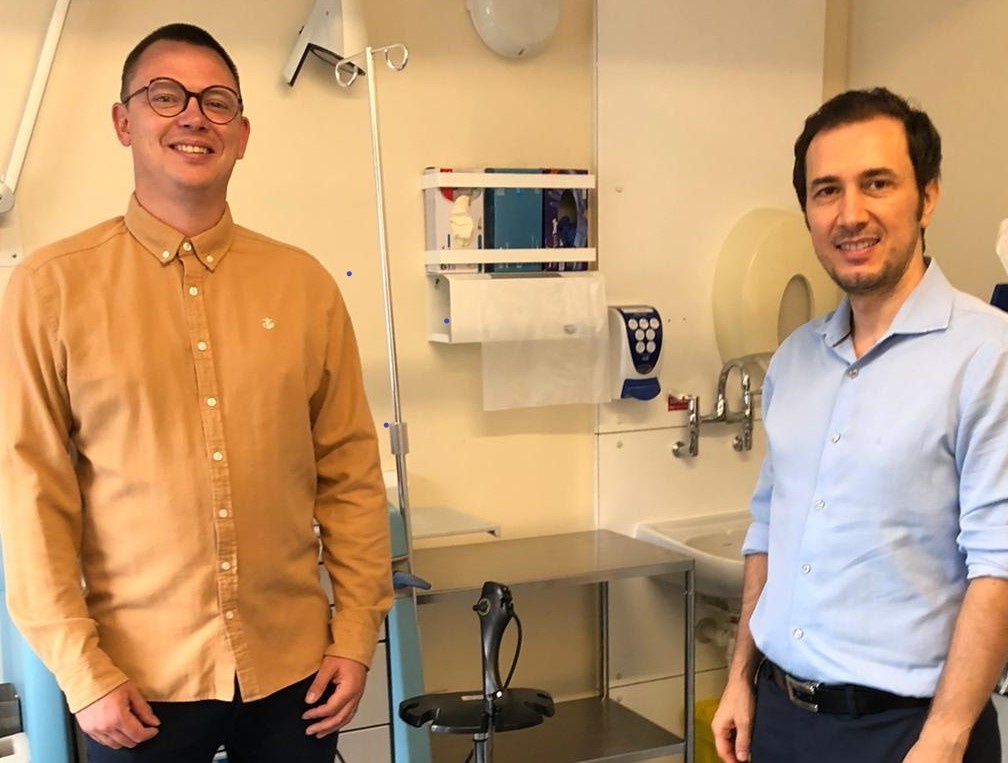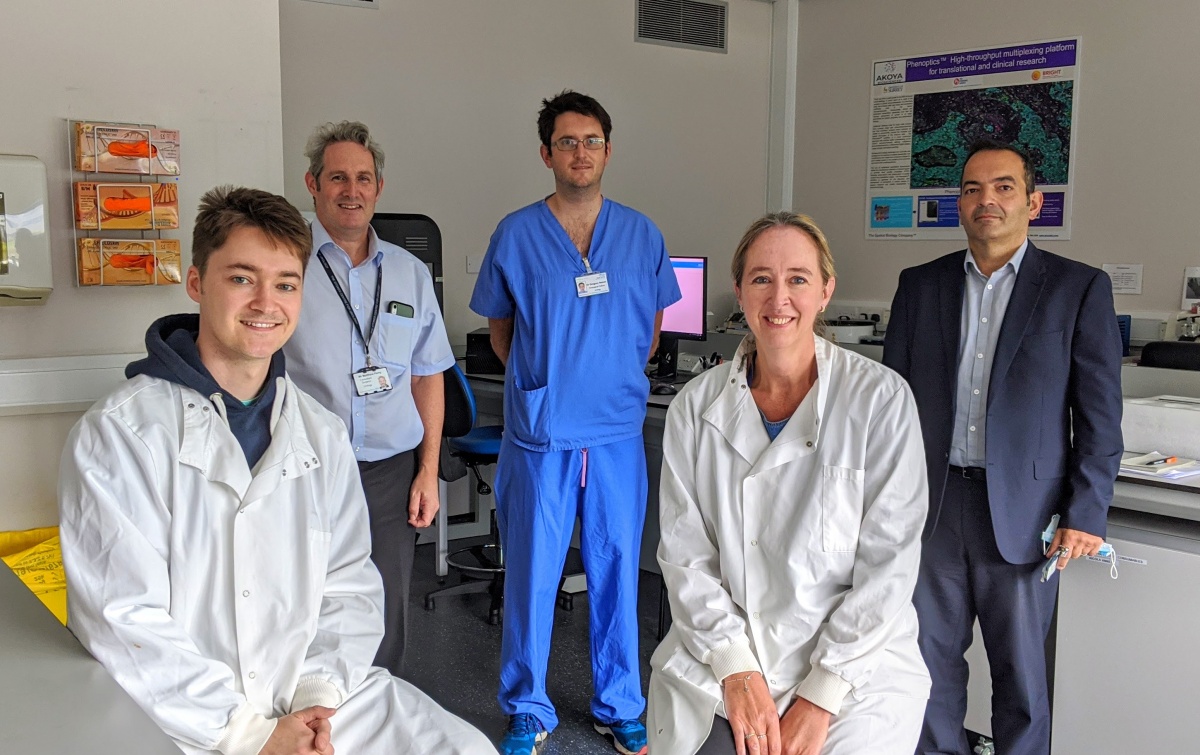The 2020 round of ABC UK's IOPP grants programme opened for applications in November 2019 and closed at the end of February 2020. This year has of course been very challenging for everyone, however those working within health services have been particularly impacted and the majority of our applicants to this year's awards were unable to undertake additional research work or to commence their planned projects due to the impact of Covid-19. ABC UK decided to take a flexible attitude to our grants in 2020 - we felt strongly that we still wished to fund the bladder cancer projects we had selected - and so extended the time frame for projects and supported each applicant to start their work at an appropriate time. We are now delighted that the five excellent projects our panel chose as recipients of a grant, have confirmed that they are now able to start their work either immediately or in the coming weeks. We shall add details of each project as they commence.
RESEARCH & CLINICAL CATEGORY
Project: Promoting physical activity to bladder cancer survivors
Project Leads: Dr Lee Smith, Reader in Physical Activity and Public Health, Director of Research and Income Generation, Cambridge Centre for Sport and Exercise Sciences, Anglia Ruskin University; and Dr Cristian Ilie, consultant urological surgeon and Urological Cancer Lead, Research and Innovation Director at The Queen Elizabeth Hospital Foundation Trust (King's Lynn).

There are many common physical and psychological consequences of cancer and treatment, including fatigue, pain, sleep disturbance, lymphoedema, weight gain, loss of muscle mass, cancer-related distress (e.g. fear of recurrence, financial concerns), anxiety, and depression. Furthermore, the majority of people living with and beyond cancer (LWBC) are living with at least one other long-term chronic condition (e.g. hypertension, obesity, mental health conditions). The Independent Cancer Taskforce recommended that everyone diagnosed with cancer in the UK should have access to the elements of the Recovery Package by 2020. This was upheld in the recently published NHS Long Term Plan. Physical activity (PA), is highlighted in the Recovery Package due to evidence from randomized controlled trials (RCTs) of PA interventions that show improvements in fatigue, pain, sleep, lymphoedema, anxiety and depression, body composition and quality of life in people LWBC. Furthermore, there is a large body of observational evidence that shows that people LWBC who are more active have reduced all-cause and cancer-specific mortality risk and a reduced risk of cancer recurrence.
However, despite this, to date, no trial exists to increase physical activity in those living with and beyond bladder cancer. Symptoms present in bladder cancer (differentiating from other solid tumour cancers) may further discourage individuals from participation in PA. Specifically, frequent urination and pain. Patients with some types of bladder cancer might also have a uro-stoma that can interfere with the perceived body image. It would be highly beneficial for patients and clinicians to have a simple tool which can be utilised to promote PA in bladder cancer survivors (survivor defined as point of diagnosis and beyond) that also takes into account its specific symptoms. Any tool developed to promote PA should be embedded in habit theory to ensure any increase in PA is sustained over time and not "short lived" and the aim is to improve physical and mental health outcomes (during treatment and beyond).
The aim of this project is to develop a tool to promote physical activity in those living with and beyond bladder cancer- it will be embedded in habit theory to ensure physical activity is sustained and will be in the form of a self-guided printed booklet. The content will be developed by patients, health professionals and experts in the field, and be given to the patients between diagnosis and treatment by the medical consultant leading the patients care. The impact of the booklet on patients' physical activity levels, physical and psychological health will be evaluated using an experimental trial, and patients interviewed to identify their experiences of using the guide. Ultimately,the aim is to integrate the content into a mobile application, which can be disseminated more widely.
Project: Urinary microbiome as a predictor of response to Bacillus Calmette-Guerin (BCG) immunotherapy in non-muscle invasive bladder cancer
Project Lead: Dr Nicola Annels, University of Surrey

Surrey Bladder Cancer Team: Back left: Mr Matthew Perry - Consultant Urological Surgeon, Back middle: Gregory Nason - Senior Clinical Fellow, Back right: Mr Hugh Mostafid - Consultant Urological Surgeon, Front left: Tyler Wooldridge - PhD student, Front right: Dr Nicola Annels - Senior Research Fellow
Whilst urologists have been using BCG for over 40 years to manipulate the bladder microbiome to treat NMIBC, the patient's own pre-existing bladder microbiome may have a role both in the development of bladder cancer and its response to immunotherapies. An understanding of the potential dysbiosis - the imbalance or alteration of bacterial composition of microbiota - in bladder cancer could lead to the bladder microbiome of patients being used as a modifiable way to optimize response to immunotherapy. Research to date suggests that the bladder microbiome may modulate the bladder microenvironment by various mechanisms. Bacterial strains have been shown to attenuate mucosal inflammation by inhibiting the NF-B pathway, IL-6 and IL-8 which could affect immunotherapies e.g. BCG, that rely on the initiation of a local inflammatory response. Other studies have shown that certain bacterial species e.g. Lactobacillus iners, one of the prevalent genera detected in the human urinary microbiome, may be superior at binding fibronectin thus out-competing BCG whose activity relies on binding to urothelial fibronectin. To date, only a small number of studies have investigated the role of the urinary microbiome in bladder cancer and, whilst providing some preliminary interesting findings, are limited due to the low numbers of samples studied and their use of potentially contaminated voided urine. Larger scale future studies using catheterized urine need to be conducted to accurately evaluate the potentially important role of the bladder microbiome in both bladder cancer pathogenesis/progression and response to immunotherapy agents.
This project sets out to determine:
This will allow the team to determine whether the urinary microbiome can be used as a predictor of response to BCG immunotherapy. Furthermore, therapeutic alterations of an ‘adverse' pro-malignancy microbiome in the bladder may be possible and effective in bladder cancer management just as altering the bowel microbiome using faecal transplantation may improve response to immunotherapy drugs in cancer such as malignant melanoma.
The patient's bladder microbiome (bacteria in bladder lining) may have a role in development of bladder cancer and its response to immunotherapies. We will investigate differences in microbial composition of bladder tumour tissue and urine between patients with recurrence (BCG-failure) and without recurrence potentially providing a predictive marker for response to BCG therapy. Analysis of the patient's tumour immune-microenvironment will reveal the role the microbiome plays in shaping the bladder immune response. Understanding the alteration of bacterial composition in bladder cancer could lead to the bladder microbiome of patients being used as a modifiable way to optimize response to immunotherapy.
Project Title: transurethral REsection and Single instillation mitomycin C Evaluation in bladder Cancer Treatment (RESECT)
Project Lead:
Veeru Kasivisvanathan, Chair BURST Research Collaborative, Academic Clinical Lecturer in Uro-Oncology, UCL, Lead for CPD, Division of Surgery and Interventional Science, UCL, Hunterian Professor 2020, The Royal College of Surgeons of England

Superficial bladder cancer, known as Non muscle-invasive bladder cancer (NMIBC) is common and expensive to manage. There is evidence that the quality of the initial operation performed, and a single administration of bladder chemotherapy following the operation, can reduce cancer recurrence rates and progression to more invasive cancer. This study will compare the quality of these operations across hospitals and countries. We believe that by measuring and reporting performance, the quality of surgery for superficial bladder cancer will be improved internationally.
The primary objective of this study is to measure and report the quality of TURBT surgery across surgeons, hospitals and countries and use comparative data to drive up quality standards. We aim to determine:
What the rate of achievement of quality indicators (e.g. obtaining muscle in the specimen, using single instillation mitomycin C, performing a complete resection) in TURBT is across the world
The project will achieve the first international performance assessment for TURBT surgery and aim to drive achievement of the best possible TURBT operations. Patients will directly benefit through: